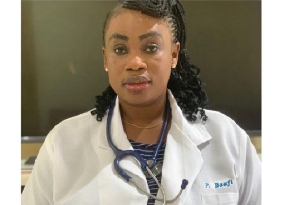- Home - News
- TWI News | TV
- Polls
- Year In Review
- News Archive
- Crime & Punishment
- Politics
- Regional
- Editorial
- Health
- Ghanaians Abroad
- Tabloid
- Africa
- Religion
- Election 2020
- Coronavirus
- News Videos | TV
- Photo Archives
- News Headlines
- Press Release
Opinions of Thursday, 13 June 2013
Columnist: Okoampa-Ahoofe, Kwame
On First-Degree Lecturers, "Yes!" And "No!"
By Kwame Okoampa-Ahoofe, Jr., Ph.D.
The congregational announcement by Prof. Francis Amedahe that very soon the bachelor's degree will not be enough for teachers intent on securing a job at any of the country's 38 teacher-training institutions and colleges, ought to be taken with a pinch of salt (See "Lecturers With First Degree[s] At Colleges Of Education To Lose Jobs If...." The Chronicle 6/7/13).
Prof. Amedahe reportedly made his cautionary announcement at the Amedzofe College of Education, in the Volta Region of Ghana. The rationale of the former Cape Coast University lecturer is that the skills and pedagogical and/or academic demands of the education profession are increasingly becoming expansive and far too complex to be adequately met by many a teacher-training college lecturer/tutor with only a bachelor's degree.
Indeed, as someone pointed out recently in an opinion piece that was published on Ghanaweb.com, no two doctoral degrees are any more equivalent to one another than any two bachelor's degrees of two different holders of the same ought to be envisaged or judged to be of identical quality. The commentator/critic went on to further observe that no two academic institutions are of exactly the same caliber of educators or pedagogical rigor.
In other words, what Prof. Amedahe ought to be focused on is the imperative need for the country's colleges of education to upgrade the curricular fare of first-degree or undergraduate courses in order for trainees and future first-degree holders to be able to meet new professional and technological challenges.
Consequently, merely compelling college lecturers with only the bachelor's degree to enroll into graduate studies programs will not necessarily facilitate the creation of a viable pool of well-educated faculty for these seminal academies. What needs to be put in place is a comprehensive package of faculty development programs, such as regular conferences and orientation programs for these educators without, of course, totally ruling out the significant acquisition of graduate degrees.
For instance, professional programs could be set up to encourage first-degree holding faculty to navigate the critical shoals of research methodology and publication in order for them to be able to remarkably add onto the corpus of knowledge in their disparate disciplinary specialties. What I am clearly implying here is that merely holding an advanced academic degree does not necessarily a scholar make. The depth and breadth of one's creative output, both within and without the classroom environment and setting, is what matters most.
That there is relatively little that passes for genuine and meaningful scholarship going on in the major academies of the country, clearly appears to be what is considerably regressing the salutary development of Ghanaian higher education. For instance, not many journals, if any at all, of global competitiveness, reach and repute are either housed and/or published by such flagship academies as the University of Ghana and the Kwame Nkrumah University of Science and Technology.
On the practical side, also, one does not see much by way of the organic or bonded interaction between Ghanaian colleges and their surrounding communities and districts the way that the college where I presently teach, for instance, is symbiotically connected to its service or catchment community. Educational activities and programs are regularly designed and hosted by my college's faculty, staff and students with the active participation and engagement of the members of both the home county and nearby towns and villages.
This is what a meaningful educational system is about; and this is what academic administrators and educators like Prof. Amedahe ought to be more critically focused on.
_______________________________________________________
*Kwame Okoampa-Ahoofe, Jr., Ph.D.
Department of English
Nassau Community College of SUNY
Garden City, New York
June 7, 2013
###










